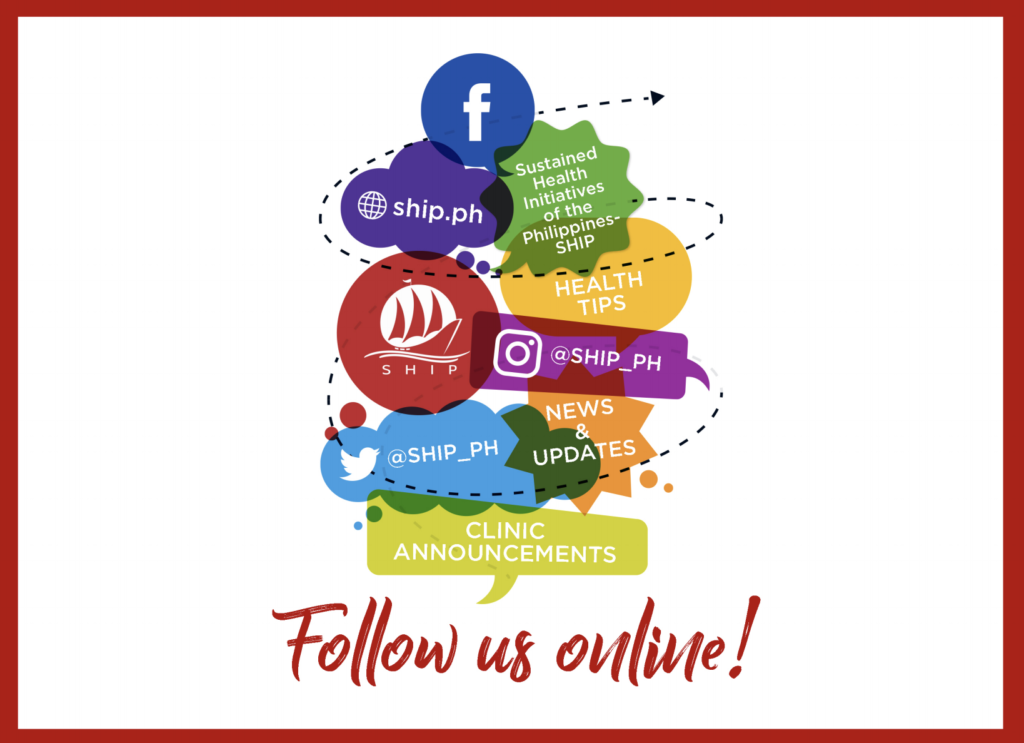Sustained Health Initiatives of the Philippines (SHIP) is a non-stock, non-profit organization that offers affordable, high-quality HIV primary care directly to communities that need it the most. Established in 2015, SHIP aspires to intensify the quality of HIV care delivery in the Philippines through evidence-based practice.
Mission
SHIP’s mission is to bridge gaps in the HIV response by strengthening the continuum of care through innovation, partnerships, and capacity building.
Vision
SHIP envisions a holistic approach to health and wellness that enables people in the Philippines to achieve their potential.
Core Values
• High-leverage
Our philosophy is to simplify. We design our services to be low-cost and high-impact. Innovative and results-driven We want to be on the cutting edge of HIV care, bringing evidence-based best practices to the market as fast as possible. We are open to new ideas, and will serve as an incubator to drive change and innovation.
• Client Driven
We listen to the people infected and affected by HIV. We draw on the first-hand experiences of our clients and find solutions that meet their needs.
• Inclusive and Ethical
Stigma and discrimination have no place in our community. Fear and outdated perceptions are the biggest barriers we currently face in combating the HIV epidemic. We continually challenge bias and discrimination where we see it.
• Sustainable
The SHIP clinic(s) are low-cost, fee-for-service facilities. Our programs generate revenues to cover operating costs and day-to-day functions.
• Scalable
SHIP aims to empower everyone involved in HIV care to take action: patients, physicians, families, and advocates. Our approach can be easily replicated, so long as we have passionate and visionary people driving it forward.
HIV Response: Our Pillars
Continuum of Care
Our partner SHIP Clinic aspires to deliver comprehensive medical care and social services to its patients. Our goal is to engage all newly diagnosed patients in medical care and supplementary social services, and assist them through each phase of the HIV care continuum, to eventually achieve their goal of viral suppression and maintenance.
Capacity-Building
SHIP believes in providing quality healthcare to wherever it is needed. By providing a training ground for doctors, nurses, and other healthcare providers to gain expertise in HIV care and treatment, access can be easily expanded to care to meet the needs of Filipinos. Training on the basics of HIV should allow any doctor who holds a clinic to incorporate HIV care easily into his or her existing clinic structure. In this way, our objectives are to increase the number of doctors offering HIV care as part of their established practice, as well as to open up new clinics opened up in the communities most affected by HIV.
HIV Primary Care Workshop
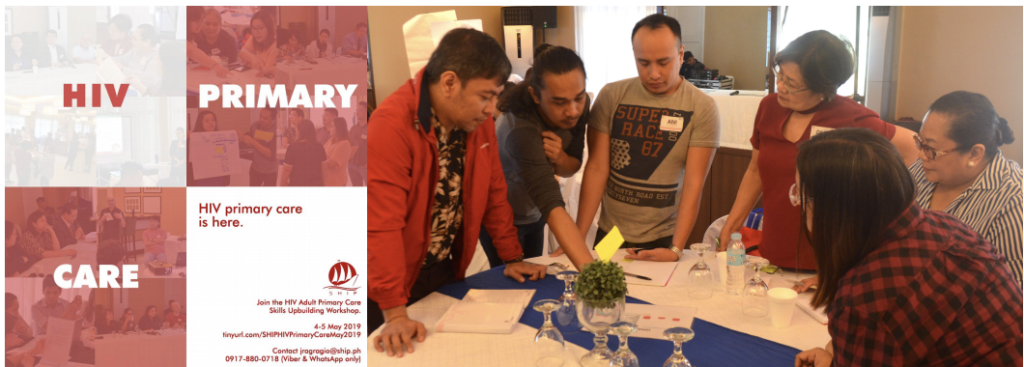
The current gap in HIV healthcare is seen in the need to provide continuing professional development to the not only the frontlines of the fifty (50) treatment hubs and twenty-five (25) primary care facilities catering to more than 50,000 PLHIV all over the country — but also to the doctors not working in these institutions, but who see patients with HIV (diagnosed or undiagnosed) everyday. By enhancing HIV knowledge of every doctor in the
Philippines, we will be able to diagnose early, link to care, improve health outcomes, and improve PLHIV quality of life. In an effort to bridge this gap, SHIP and ID experts from the Foundation for the Control of Infectious
Diseases (FCID) of the Philippine General Hospital created the HIV Primary Care Skills Upbuilding Workshop.
HIV Telehealth Training Program (http)

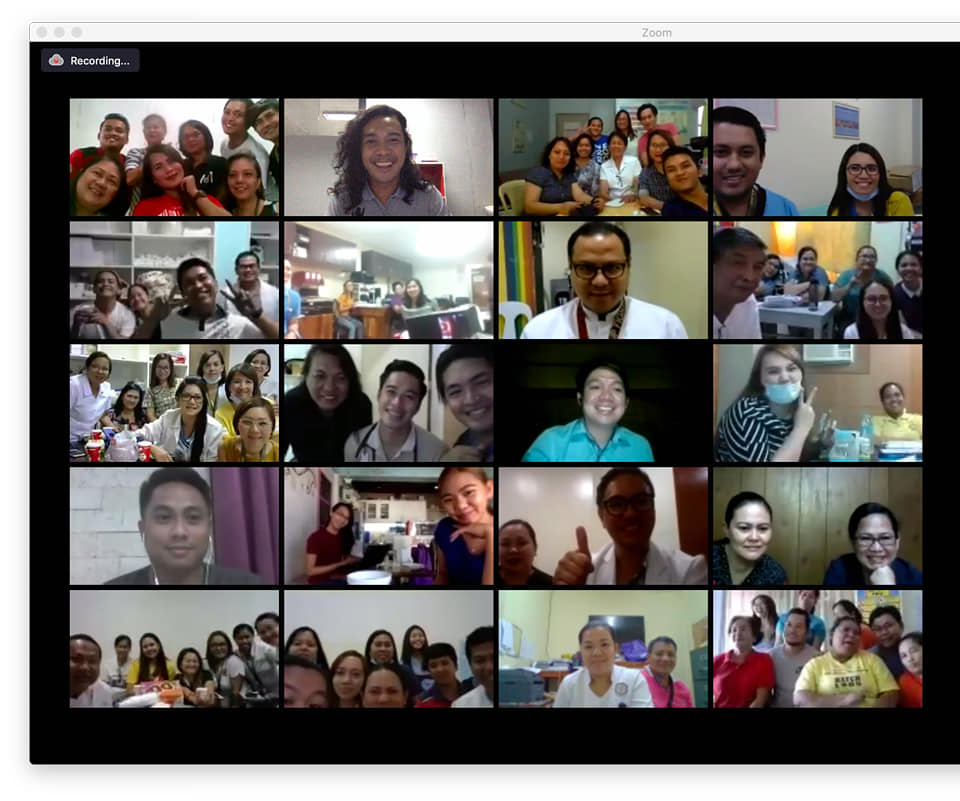
The HIV Telehealth Training Program (HTTP) is patterned after the model adopted in Vietnam, which was largely motivated by the University of New Mexico Health Sciences Center’s Department of Internal Medicine’s Extension for Community Healthcare Outcomes (ECHO) or Project ECHO. The latter was developed as an innovative approach to improve access to high quality clinical care among rural and underserved population in New Mexico through capacity building of primary care physicians and other healthcare workers. Project ECHO used videoconferencing technology to bring together multiple community-based primary care physicians with specialists from academic centers for the purpose of comanaging the patients handled by the former.
Telehealth allowed providers from multiple locations to connect simultaneously with a central team of experts, allowing for experience sharing and peer-to-peer learning between clinical sites. Learning is exponential, as participants can also serve as hubs of information of the institutions within their jurisdiction.
Pragmatic Collaboration: Increasing Access to Holistic Care for PLHIV Who Use Drugs

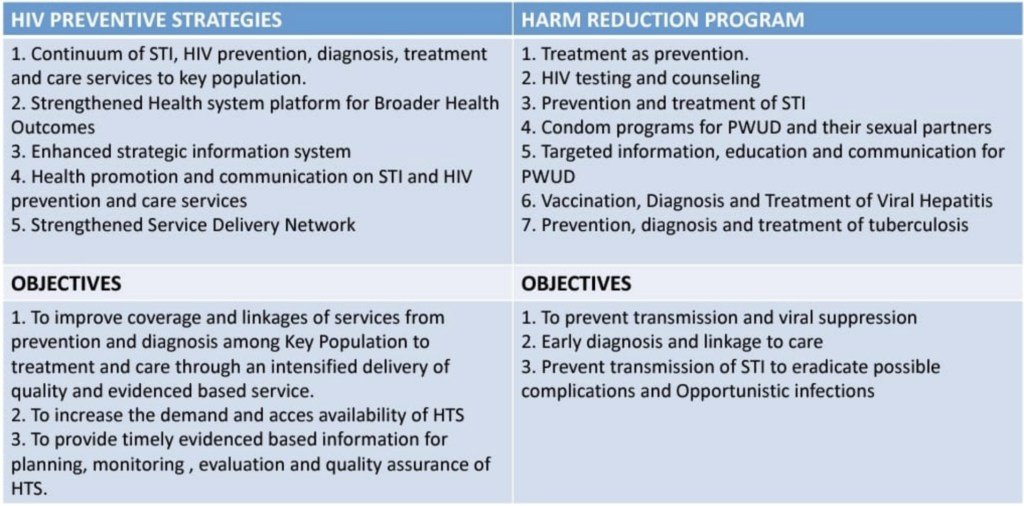

Substance use is one of the key challenges in successful care and treatment for HIV. Substance use is not only associated with higher risk of acquiring HIV, but it also leads to poor adherence to antiretroviral therapy, which in turn is associated with poor treatment outcomes and increased mortality. These intersecting issues pose special challenges for medical providers. Integrated care is the best treatment option, but at present, there are no
services in the Philippines catering to the needs of PLHIV who use drugs.
With support from the Foundation for AIDS Research (amfAR), SHIP aimed to create a way to address the intersecting problems of HIV and Drug Use in the Philippines. To achieve this, a network of health care professionals should be established to create a longlasting, sustainable, and holistic case management system between the rehabilitation care facilities and HIV treatment hubs. Because of this training, 50 HIV care and drug use care
providers have strengthened their referral network and developed a concrete protocol in managing co-occurring conditions in HIV & drugs in their respective facilities all over the country.
Innovation & Research
SHIP persists in expanding research in HIV care at a global level and contextualizing it to the Philippine setting. By developing strategies that adhere to the needs of its clients, sharing best practices to improve clinical care, and strengthening systems among its partners, we aim to be a springboard for optimal medical delivery and social services in HIV
care.
Some of our innovative programs:
• ART-Electronic Consultation
• Differentiated ART Delivery
• Connect for Life (mHealth) Platform
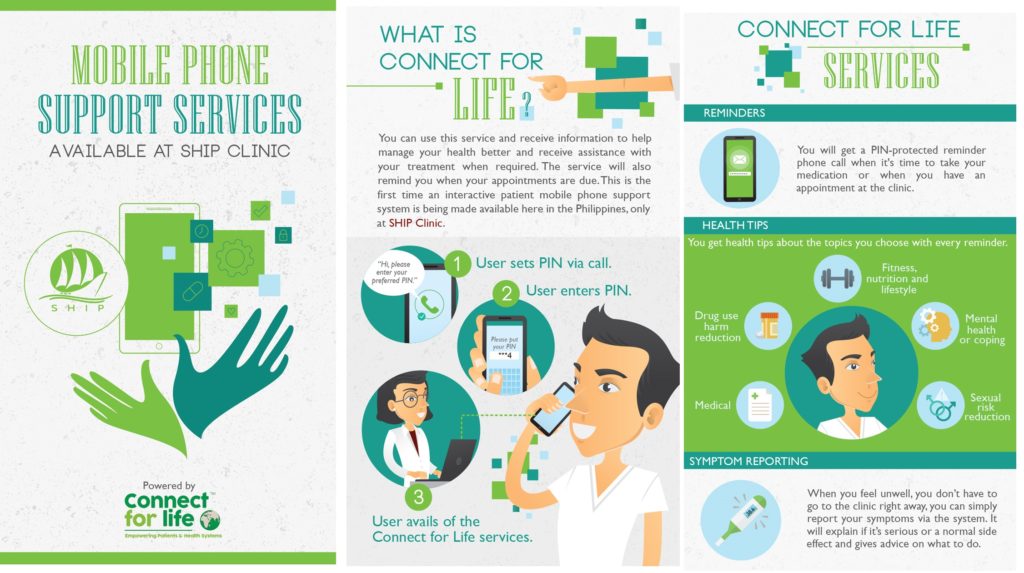
Research Studies:
• Integration Harm Reduction Principles (IAS-AIDS)
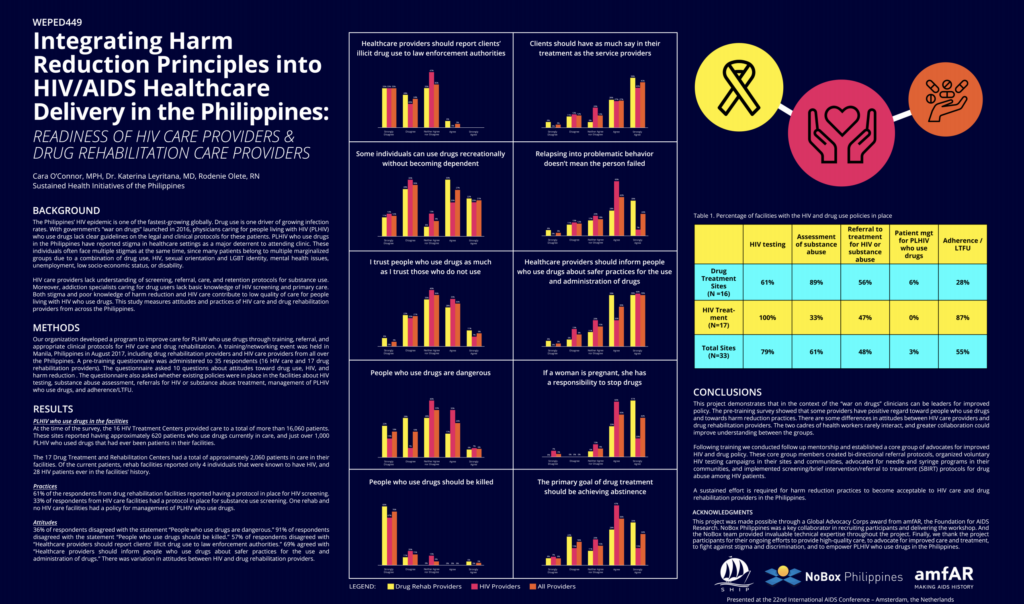
• Barriers to Accessing Quality Care (IAS-AIDS)
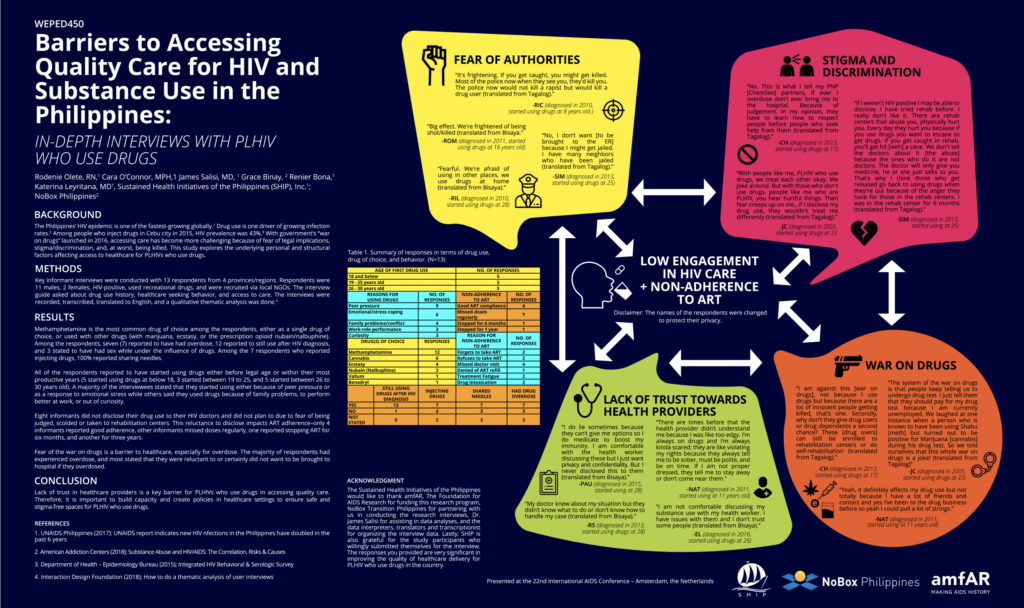
• 5-Point Modular Training for HIV & Drugs (IAS)
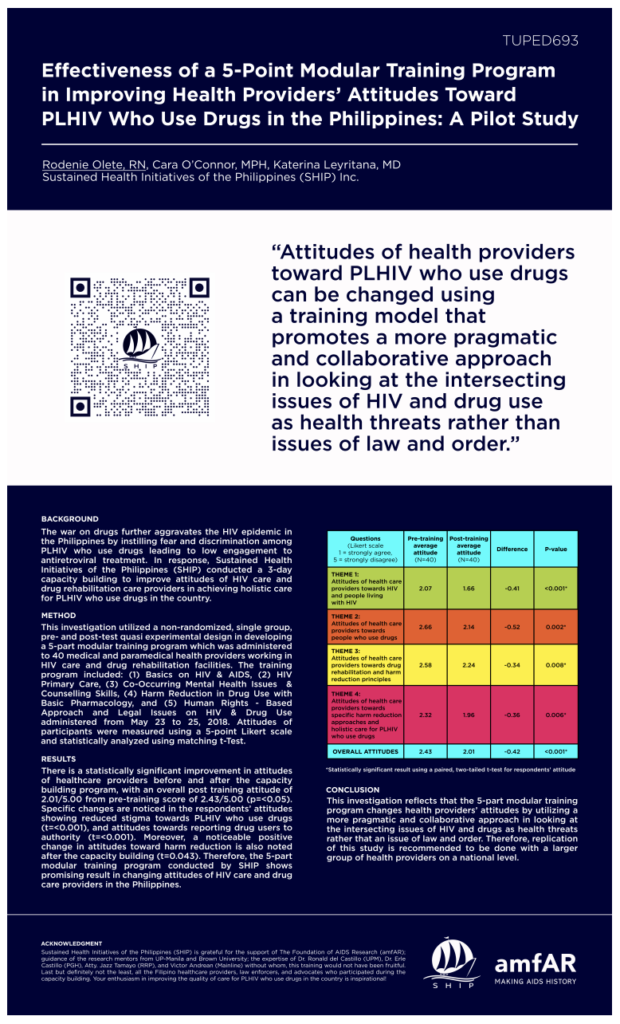
• HIV Telehealth Training Program (IAS)
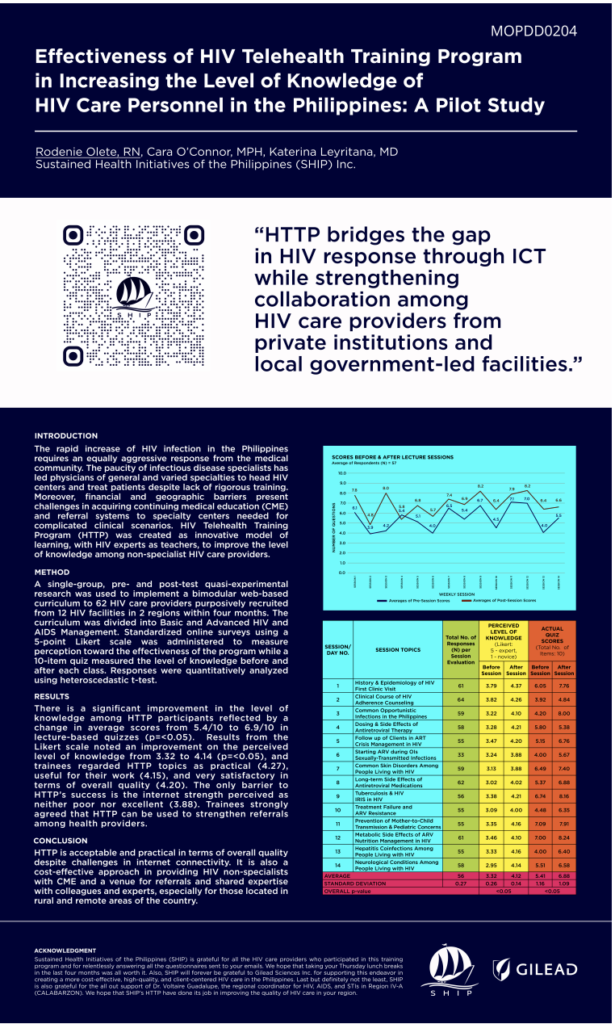
• Chemsex among Cis-MSM (UNODC) ongoing
Outreach & Advocacy
SHIP subscribes to the crucial role of the growing community of HIV advocacy. More than ever, the success of community efforts in providing comprehensive HIV care, particularly to relevant populations, is becoming more widely recognized as essential to ending the epidemic. In participation with other relevant stakeholders, relevant efforts in social
mobilization and policy advocacy could help overcome many of the major challenges in responding to the growing HIV dilemma. Through community involvement, multi-sectoral cooperation, and active involvement in policy advocacy, SHIP strongly believes that the Filipino will overcome this rapidly increasing epidemic.
Be our partner!
For more information on how you can support SHIP, email
us at info@ship.ph or directly email Hoffman Cureg at hcureg@ship.ph.
For assistance in training on HIV Primary Care and other
capacity-building programs on HIV and AIDS, please directly email Rod Olete at rolete@ship.ph.
